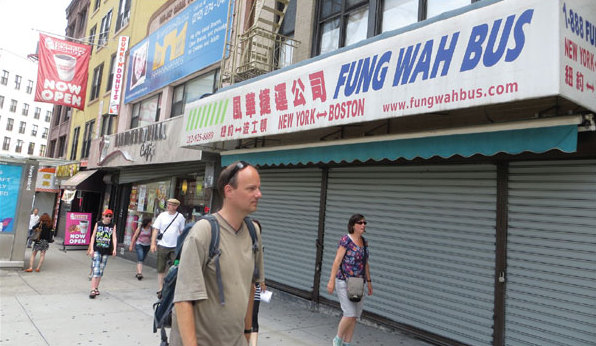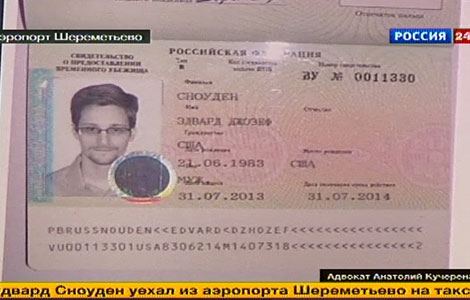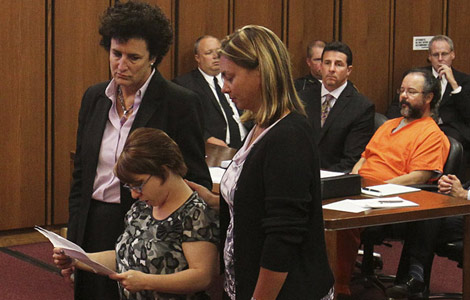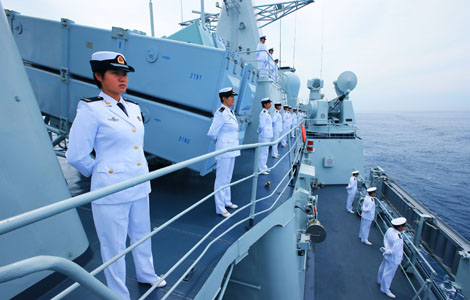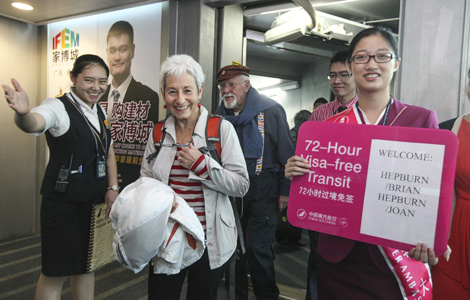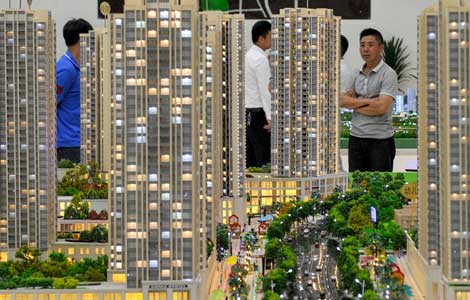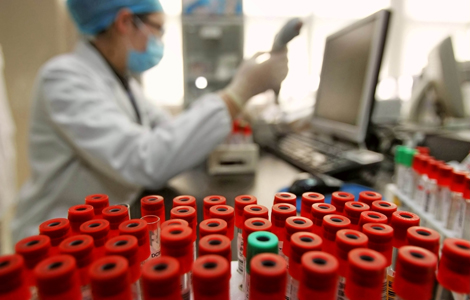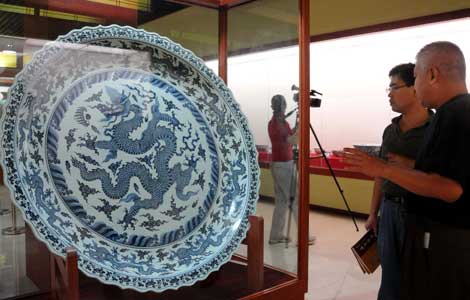Waiting for Fung Wah and Lucky Star
Updated: 2013-08-02 11:36
By Caroline Berg (China Daily)
|
||||||||
|
The Fung Wah Bus company (above) and Lucky Star Bus in Manhattan's Chinatown are closed for business until they fix violations found by federal authorities. Photos by Caroline Berg / China Daily |
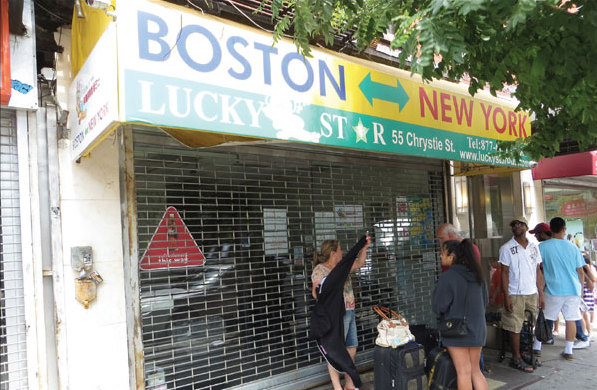
The shutting down of the Chinatown-to-Boston bus lines Fung Wah and Lucky Star until they fix a series of violations is taking a toll on the lines' neighborhood businesses, reports CAROLINE BERG in New York.
On a day when the temperature in New York City hit about 100 degrees Fahrenheit, a Chinese traveler stood on the sidewalk outside the one-story Lucky Star bus office in Chinatown, hoping to catch the 3 pm coach to Boston. Unbeknownst to the would-be rider, it would never come; nor would any of the other Lucky Star buses that made the 215-mile daily trip.
Behind the man, a printed notice on the bus line's glass door that was propped open by a garbage bin read: "Per the order of USDOT Lucky Star Bus has temporary ceased operations."
Around the corner on Canal Street, the office door at the Fung Wah Bus company stood ajar. Three Chinese women with a small child sat inside by a humming floor fan, taking a break from cleaning the room. "We'll be opening back up in a month or two," one of the women said. "Check our website and you'll see."
And on that website, this notice:
"Fung Wah Bus is suspending all buses service to compliances a requested by US Federal Motor Carrier Safety Administration for inspections and repair services. Fung Wah bus will resume buses service soon after an inspection and repair service is complete by inspectors."
Lucky Star and Fung Wah, two bus lines that offered cheap fares - $15 for a one-way ticket - between New York's Chinatown and Boston were shut down earlier this year by the US Department of Transportation's Federal Motor Carrier Safety Administration (FMCSA) for a series of violations that ranged from a large hole (4-feet-by-2-feet) in the bottom of one Lucky Star bus, to untrained drivers at Fung Wah.
Though another bus line - Yo! - has moved in to take their place, the suspensions of Fung Wah and Lucky Star have not only affected travelers, but also businesses in the immediate area of their offices that catered to the curbside lines of people.
"Our business has been affected a lot," said Sinclair Tsang, owner of Diamond Hill Caf, an Asian-Mexican fusion restaurant next to the Fung Wah office. "Last summer we had so many more customers because people want to find something to eat while they're waiting for the bus."
The restaurant is by the busy intersection of the Manhattan Bridge, Canal and Bowery streets, and isn't an obvious location for people to search for food, unless they are waiting for a bus.
"We need the business from the bus riders," Tsang said. "We might have to close down."
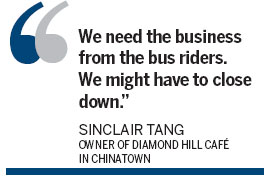
The manager at the Popeye's on the corner of Canal and Chrystie streets, between the two bus lines, said business was down about 10 percent since the lines of Boston-bound passengers had disappeared. At the Dunkin' Donuts next to the Fung Wah bus office, the manager put a dollar figure on his loss: $500 to $600 a day.
Mindy Cheung, owner of Yaya Tea Garden on Chrystie Street by the shuttered Lucky Star office, said the bus closings haven't substantially affected her business, but "their closure has really hurt other businesses on this street."
Alin Zhang, owner of the "9 to 9 Happy Store" on Chrystie Street, said everyone on the street was asking why Lucky Star had shut down. She said the company had worked hard to improve its service and operations, including a good office with air conditioning, bathrooms and nice people who dressed sharp.
"The whole street is quiet now. Look outside, you don't see anyone," Zhang said. "If Lucky Star leaves, I will have to close my business."
And 123 miles from Chinatown, in Manchester, Connecticut, the owner of a Japanese food restaurant where Lucky Star would make a pit stop is upset by the bus line's absence. The Misaki Japanese Seafood Buffet Restaurant started a Facebook page called "Save the Lucky Star Bus."
"The elimination of the Lucky Star will not only inconvenience hundreds of daily travelers, but also may put [Misaki] out of business. We won't stand for it!" the restaurant posted on the page.
Neither Fung Wah nor Lucky Star could be reached for comment for this story.
Wellington Chen, the executive director of the Chinatown Partnership, provided estimates for all the bus lines that carry passengers from Chinatown to 60 cities along the East Coast. Chen said the bus lines carried 5 million to 6 million people a year and together had annual revenue's of more than $100 million, according to data from research done by an intern for the Partnership, which is a not-for-profit organization founded in 2006 to bring community groups, businesses and members together to help sustain Chinatown's culture and vitality. The data could not be independently confirmed.
Chen has worked to defend the Chinatown bus system since the beginning of the Chinatown Partnership's existence.
'Not fair'
"Relative to the volume of people, Chinatown buses transport and looking at actual records, it's not fair to label Chinatown buses unsafe," Chen said.
Federal regulators saw it differently.
Fung Wah was the first of the two lines to be shut down, receiving an "imminent hazard" warning in March and ordered to suspend its services. During more than a month of investigations earlier this year, the FMCSA said it found evidence that Fung Wah failed to inspect, repair and maintain its vehicles, as well as falsified inspection records. In addition, the company's drivers failed to meet drug and alcohol testing requirements, or prove they were qualified drivers.
Fung Wah was involved in six accidents between 2005 and 2008, including collisions with dividers and guardrails, a bus fire, and losing the rear two wheels while driving passengers on the Massachusetts Turnpike, according to regulators. In 2006, a Fung Wah bus rolled over and injured 34 passengers, caused by excessive speed, according to authorities.
In June, regulators then ordered Lucky Star off the road immediately after federal investigators found mechanical and operational violations.
Regulators discovered that the dispatched Lucky Star bus with the hole in the bottom also had significant frame damage. Other buses were found to have rotted floors, and inspectors tallied 10 buses that broke down a total of 80 times in less than 13 months.
Meanwhile, Yo! Bus, jointly operated by Greyhound Lines and Peter Pan Bus Lines, opened an office in a nearby section of the Chinatown neighborhood - a 5-minute walk from the Lucky Star and Fung Wah offices.
Yo! began service between Chinatown and Philadelphia in December 2012 and expanded its service to Boston in March of this year. Now it's the only bus running the Chinatown-Boston route.
The name of the fire-truck red bus is derived from the pronunciation of the word for "to protect" in Chinese. The fleet's aim to be environmentally friendly, according to the company website, and its buses include Wi-Fi, power outlets, footrests and fully reclining seats.
A one-way ticket is as low as $12, but typically runs from $17 to $25, with five to six daily round trips between Boston's South Station and Chinatown. A ticket agent at the INT Travel Group on 98 E. Broadway, where Yo! tickets can be purchased, said the company is awaiting the Transportation Department's approval to increase the number of daily roundtrips to 14.
"Chinatown buses created an industry that Greyhound could not ignore," Chen said. "Now Greyhound is down here trying to compete on our turf."
Service by Yo! has been greeted with mixed reviews by customers. On Yelp.com, Yo! was given two out of five stars.
"Hands down the worst customer service experience in my entire life," wrote New York-based customer Betsy R. in her Yelp review. "The bus was two hours late. They never gave us an [estimated time of arrival], so we had to wait outside in heat advisory weather.
"If I could give zero stars, I would," she wrote. "[I] would encourage anyone looking for a cheap bus ticket to look elsewhere. Like anywhere else."
Greg Kirkpatrick, who lives in Brooklyn, stood outside waiting for a Yo! bus to Philadelphia this week and said he was happy with the service. He said that he had used Megabus and Boltbus in the past and thought Yo! was in a more convenient location, offered a good price and was more timely.
Back on Yelp, reviewer Shen J. said he had taken Yo! six times and, although the leather seats with power outlets made the trips comfortable, the trip took six hours without a rest-stop break.
"I find it very ironic that they try so hard to market themselves as a Chinatown bus, to the extent of writing meaningless Chinese [characters] on the bus, when they have none of the core principles of a Chinatown bus company," the reviewer wrote.
The so-called core principles of a Chinatown bus company appear to be limited to the convenience of buying a ticket curbside and the low cost. One travel company website says of Fung Wah and Lucky Star: "Bear in mind, we're not talking about luxury transportation here. However, if you're a college student or other traveler with limited means, you'll be among frugal comrades in addition to many Chinese travelers."
Fung Wah is the oldest of the bus lines that have operated from Chinatown to Boston. The name originates from the Cantonese pronunciation of the Chinese phrase for "magnificent wind."
According to a 2004 New York Times' article, Fung Wah was founded in New York City in 1996, as Fung Wah Transport Vans, Inc, by Pei Lin Liang, who had immigrated from Zhuhai, China in 1988. Before founding the company, Liang had worked as a driver for Four Seas, a local Chinese shuttle service that took passengers from Sunset Park in Brooklyn to Chinatown in Manhattan. Liang founded Fung Wah to compete with his former employer in transporting Chinese garment and restaurant workers between Brooklyn and Chinatown for a dollar fare.
A year later, the business offered service to Boston for customers who wanted to visit their children in college there, according to the Times' story.
Budget travelers up and down the Northeast know Fung Wah as the original Chinatown bus. The company was the first to start running vans and buses between Boston and New York at bargain rates, becoming something of a cult phenomenon. Some customers dubbed Fung Wah as "The TB Express," due to people on board often coughing and sneezing, as well as filling the air with a mix of smelly food aromas.
"People always try to convince me to take Megabus or Boltbus instead of the death trap that is apparently Fung Wah," wrote Madeline M. in a review on Yelp earlier this year, in which she gave Fung Wah five stars. Megabus and Boltbus run service to Boston from other Manhattan locations outside of Chinatown.
"Fung Wah is super flexible. You basically go up to the counter 10 minutes before, get your ticket, and peace out," she wrote. "They are super efficient; they know what they're doing."
Sometimes livestock
Another reviewer by the name of Davin L. from Chicago, wished the "sketchy" bus company to rest in peace after it was shut down. For $15, he said, passengers could get "a thrilling, white-knuckle race to your destination," flexible ticketing with no additional charges for last minute changes and "a front-row seat to the full spectrum of humanity, and sometimes, if you're lucky, livestock."
When Fung Wah left the Chinatown scene, customers swarmed to Lucky Star's Yelp page after the company suddenly raised its fare to $25 from $15. "One thing's for sure, Lucky Star is no Fung Wah," a New York-based customer wrote. "With all the horror stories of Fung Wah, I've taken it for years and am still alive and well today."
The reviewer said Lucky Star didn't seem able to handle the volume of customers from the overflow after Fung Wah shut down and customer service declined drastically.
"Worst service ever," Paul T. from Massachusetts wrote after the price hike. "You guys drive like maniacs, and your bus smells like a urinal. Get your act together if you're going to charge so much for such [crappy] service. I used to talk you guys up, not anymore."
Chen said it's time for Chinatown's bus companies to get its act together.
"We need to get the Chinatown [bus system] to professionalize itself, so that we [in the Chinatown community] have a future," he said. "It cannot go on as this cat and mouse game for both sides - not for the bus operators, not for the passengers, not for the enforcement agents."
He said now more people realize that the Chinatown bus system is important. Now, to help not only the bus lines but also the community, Chen said companies need to apply for their permits.
"Do it!" Chen exclaimed. "Do it! Do it!"
Outside the Lucky Star office on that 100-degree day, a ticket salesman for the bus line sporting a white tank undershirt and smoking a cigarette came from a garage next to the office to where the stranded Chinese traveler stood. He told China Daily that Lucky Star's bus drivers were going through training in Boston while the line's owners were working on bus maintenance and updating the bus fleet. He said the company expected to reopen in about a month.
Duane DeBruyne, public liaison for FMCSA, said federal inspectors were still waiting for both bus companies to satisfy safety requirements to resume their service.
"Status has not changed," he told China Daily.
After listening to the ticket salesman's news, the would-be traveler asked,
"Where can I find a bus to Boston?"
Contact the writer at carolineberg@chinadailyusa.com
(China Daily USA 08/02/2013 page20)
Most Viewed
Editor's Picks

|

|

|

|

|

|
Today's Top News
Chinese worry about image abroad
NSA chief details program at hackers' conference
US, Pakistan to start new chapter in relations
Imbalance seen in Sino-US talent exchanges
Berlusconi conviction upheld; prison term sticks
China launches platform against web rumors
China sails through 'first island chain'
US rethinking Putin summit
US Weekly

|

|
